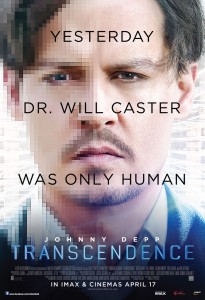 Are the consequences of uploading a human conscience to a computer more than humanity can handle? We continue the discussion of the 2014 movie Transcendence.
Are the consequences of uploading a human conscience to a computer more than humanity can handle? We continue the discussion of the 2014 movie Transcendence.
In part one, we discussed the movie’s interesting portrayal of the concepts of right and wrong, the difference between technology as a tool and the intent of its users, and the limited presentation of the theories of evolution. In part two, we look at what the creative team behind Transcendence are communicating about what sets humanity apart from creation as special.
What is Sentience?
In the movie, Transcendence centers on the question of what makes us, “us”. As with some of the best storytelling, the questions that are asked are often the same questions that are pertinent in society today. Just as with the “upload” of human conscience to a computer, the question can easily include advances on the horizons of our future like genetic programming and cloning. Is free will a component, or even a requirement, for sentience? Is the use of the name “Will” a coincidence?
In the earliest true discussions about what a successful artificial intelligence might be, Alan Turing proposed the Turing Test. If you’d like to experience one of earlier examples of attempt to defeat the Turing test, you can check out this version located at the Oxford Dictionaries blog site. I even asked Eliza for help in discussing the Turing test, but I’m afraid she wasn’t much help:
ELIZA: How do you do. Please tell me your problem. YOU: Hello Eliza ELIZA: How do you do. Please state your problem. YOU: I want to explain the Turing test. ELIZA: Suppose you got to explain the turing test soon. YOU: I would like to do it right now. ELIZA: Do you say you would like to do it right now for some special reason ? YOU: I want to be able to put the information about the Turing test in the show notes for Episode 48 of "Are You Just Watching" ELIZA: What if I were just watching" ?
Back in 1966, this was hot stuff.
Much of the movie deals with the questions of what sets sentience apart from life in general, and they use a couple of different categories to examine that. The use of emotion as a delineating factor seems to muddy the waters in Transcendence, as it appears to be another case of the creative team wanting to have its cake and eat it too. The trope of emotions being illogical is thrown out there. There is also a discussion on the necessity of self-awareness. If you’d like to know a little more about the use of mirrors in testing for self-awareness, Wikipedia has an article on it. The characters also express concern regarding the idea that a person is equal to the complete sum of his experience. Our friend Jason Rennie over at one of our sister podcasts on Noodle.mx, The Sci Phi Show has a very interesting summary of what makes us, “us” in this regard in episode 503, Transcendence, Physicalism and Consciousness. An excellent movie that delves into the idea of a person being the sum of his experience is Regarding Henry.
And the Lord God said, “The man has now become like one of us,knowing good and evil. He must not be allowed to reach out his hand and take also from the tree of life and eat, and live forever.” So the Lord God banished him from the Garden of Eden to work the ground from which he had been taken. (Genesis 3:22-23)
Is There A Soul?
Transcendence touches directly on the question, “Is there a soul, and if so, where does it reside.” Even in scripture, the terms for soul and life appear to be interchangeable. In the terms of the movie, however, the question is much more physical, as if the soul is an aspect of the physical body. As Christians, we look at the experiences of the fictional scientist and may come with presumption that a monkey failed because it lacked a soul, where a human succeeded because of the soul. Transcendence seemed to do one thing well, and that was to leave one of the primary questions of the movie unanswered in a good, thought-provoking way: was the sentience that inhabited the computer really Dr. Will Caster? Two people could easily watch this movie and come away with different opinions.
Creating God
One of the core premises, one of the core driving beliefs of many of the characters in the movie was that the creation of an artificial intelligence would be akin to, “creating god.” The movie’s creators use that line at the beginning of the movie to seed the imagination of the viewer and leave them questioning what God is. Is Dr. Caster, in his transcended form, equivalent to God? The godhood of Transcendence seems limited to the physical, completely discounting the spiritual. The physical realm is our dominion as determined by God:
And God blessed them. And God said to them, “Be fruitful and multiply and fill the earth and subdue it, and have dominion over the fish of the sea and over the birds of the heavens and over every living thing that moves on the earth.” (Genesis 1:28)
But the physical realm is not all there is to us, and it is the mysteries beyond the physical that equally as important as that of the physical.
The movie draws several parallels between the characters reactions to the transcended Dr. Caster and our God of the Bible. Not the least of these is the idea of salvation offered and rejected. Another powerful parallel is that of our desire as Christians to be the instrument of God’s will; much like Dr. Caster makes use of his enhanced followers. Like so many other stories, Transcendence also draws on the powerful nature of the sacrifice as a storytelling device. Sacrifice is a core, essential element of Christianity and Judaism, and it shows how ingrained the idea of sacrifice is in the created human psyche.
Indeed, under the law almost everything is purified with blood, and without the shedding of blood there is no forgiveness of sins. (Hebrews 9:22)
The penultimate parallel drawn that we discuss is the collective of the enhanced and cured that Will builds up, how they are connected through him, in much the same way that we as Christians are connected through the indwelling of the Holy Spirit. The first among the converts, Martin, is isolated from the collective and from Will’s influence and he begs to be rejoined to it. How great it is that we Christians need not ever fear being separated from the One, True King!
No, in all these things we are more than conquerors through him who loved us. For I am sure that neither death nor life, nor angels nor rulers, nor things present nor things to come, nor powers, nor height nor depth, nor anything else in all creation, will be able to separate us from the love of God in Christ Jesus our Lord. (Romans 8:37-39)
In the end evaluation, Will Caster made a very poor God indeed, and part of the reason is how utterly GREAT our God is. He has many, many characteristics, and hundreds of scholars over the years have set their studies to understanding those characteristics. While there a a significant number of them, here are the ones we discuss in this episode, and how Dr. Caster stacks up against those characteristics:
- Omniscient (1 John 3:20; Psalm.147:5; Hebrews 4:13; Romans 11:34)
- Transcendent Will only knows what he can see through the man-made systems networked by the internet and possibly what can be seen by satellite—people can hide from him by developing Faraday cages and staying “off the grid”
- He comes close to reading minds by measuring biochemical reactions, but he can’t actually know what people are thinking
- Omnipotent (Hebrews 1:3; Psalm 62:11)
- Will is limited by what he can physically control through his nanites with the power generated through his solar panels, though there is a great source of power for someone who can source and control all technical communication
- His ability to control people is limited by his access to them
- Omnipresent (Jeremiah 23:24; Psalm. 139:7-10; 1 Kings 8:27)
- Will is only present through technology and eventually through his nanite-controlled people, though he creates a body for himself in the end
- Omnibenevolent [also Good, Merciful, Gracious, Loving] (Mark 10:18)
- Will demonstrates a “secular” understanding of a loving god: he heals the sick without bias, he “forgives” and saves all who come to him. He does not defend himself violently but attempts to block or stall those who come against him
- Eternal (Revelation 4:8; Deuteronomy 33:27; Psalm 90:2; 1 Timothy 1:17)
- Will has a beginning and an end. Without being eternal, he is not god. The very concept of being able to create a god, means that what you create cannot be god because it is by definition, created/has a beginning.
- Just (Deuteronomy 32:4; Psalm 18:30)
- Will doesn’t appear to have any concept of justice, this is possibly because secular understanding doesn’t recognize culpability, personal guilt, or the need for forgiveness for wrongdoing.
- Holy (Revelation 15:4; Exodus 15:11; Habakkuk. 1:13; Psalm 145:17)
- Will possesses no aspect that could be termed “holy.” He is not perfect, and he demands no reverence from his followers
Finally, Paradise. The last line of the movie draws a great parallel between the Faraday protected garden at the physical home of the human Casters and that of Eden, both new and old. The movie opens with Will creating the garden to create a distraction free space where he and Evelyn could be together without the intrusion of the outside world. How similar this is to the Garden of Eden in Genesis, where God walked with Adam and Eve. At the end of the movie, it is strongly implied that the protected space of the garden is still a place where an uncorrupted Will and Evelyn can dwell for all eternity: ever lasting life.
Please support the podcast!

Are You Just Watching? is listener supported. Special thanks to our current patrons: Tim Martin, Craig Hardee, Richard French, and Stephen Brown II for their generous support. We can't continue to share critical thinking for the entertained Christian without your financial help, so please head on over to our Patreon page and become one of our supporting patrons!
Share your feedback!
What did you think of Transcendence? We would like to know, even if just your reactions to the trailer or the topics we shared in this episode. Or what general critical-thinking and entertainment thoughts or questions do you have? Would you like to suggest a movie or TV show for us to give a Christian movie review with critical thinking?
- Comment on the shownotes
- Call (513) 818-2959 to leave a voicemail
- Email feedback@AreYouJustWatching.com (audio files welcome)
- Join our Facebook discussion group.
Please connect with us
